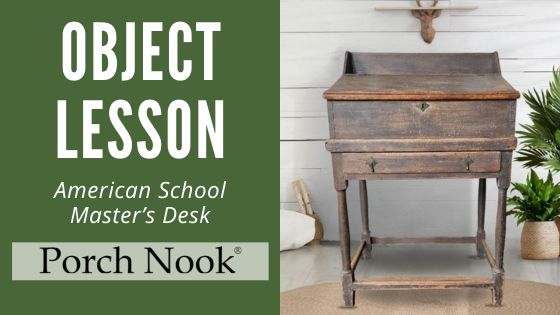
Object Lesson | American School Master's Desk
Porch Nook's "Object Lessons" is a series of short articles sharing my vintage and antique finds over the years, containing just enough information to make you dangerous at the local flea market*. Happy hunting!
Late 18th Century to Early 19th Century - value as of 11/29/24, $1200-$3200*. One of the most exciting parts of shopping at auctions and flea markets is the chance to uncover a piece of history—an object that carries the whispers of lives lived and stories told. Recently, I acquired a stunning antique** American gray-stained pine school master’s slant-top desk on a stained maple stand from the late 1700s to early 1800s. This desk is a perfect example of how functional design can become a meaningful decorative piece for modern homes.
A Desk with History
The school master’s desk was a centerpiece of early American education, embodying the authority and practicality required in one-room schoolhouses. This particular desk, with its slanted pine writing surface and sturdy maple stand, likely served as both a teaching station and storage solution for a schoolmaster guiding students of varying ages and abilities. Positioned prominently in the classroom, these desks symbolized the teacher’s role as both instructor and disciplinarian.
Designed for Purpose
What makes the school master’s desk so timeless is its thoughtful design. The slanted top wasn’t just an aesthetic choice; it was created to make writing easier while standing, a common teaching posture at the time. Beneath the surface, storage compartments provided a practical way to keep lesson books, quills, ink, and other tools neatly organized—a nod to the resourcefulness required in early American schools.

This particular piece features:
- A slant-top surface with a gorgeous, gray-stained patina, showing the character and wear of centuries of use.
- A solid maple stand, contrasting beautifully with the pine top, and offering durability that’s stood the test of time.
- Rustic Craftsmanship
American school master’s desks were often crafted from locally sourced hardwoods like pine and maple, chosen for their availability and durability. This desk’s construction reflects the practical, no-frills craftsmanship of its era. The gray stain adds a hint of elegance, highlighting the wood grain while giving it a unique, weathered charm.
A Versatile Antique
What I love most about this piece is how seamlessly it blends history with utility. While it was designed for the classroom, its compact design makes it a versatile addition to any modern home. Imagine using it as a:
- Writing desk in a cozy study.
- Console table in a hallway, paired with a vase of dried flowers and a vintage lamp.
- Statement piece in a living room, celebrating its story and craftsmanship.
Why Shop Local Markets?
Finding treasures like this at local flea markets and auctions is an adventure that connects you with the past while supporting sustainable practices. Each piece you bring home carries its own story and personality—a stark contrast to the uniformity of mass-produced furniture. Shopping locally empowers you to create a home filled with items that are not just beautiful but meaningful.
Disclaimers:
*For the sake of transparency, Porch Nook in not an antiquities dealer, nor do I specialize in antiques. However, for many years I've gained experience acquiring and selling old stuff and hung around a lot of people who also like to acquire and sell old stuff. I gotta’ tell'ya, they're my kind of people...smart, creative, not shy and will tell you what's what.
**The term "ANTIQUE" should be reserved only for items greater than 100 years old. Outside of the practice of buying and selling items, however, use of the word "ANTIQUE" can be understood to attach no specific age to an item. Some collectors hold to an 80-year marker. The 80-year marker considers the heritage of the item in that it reflects the span of two generations, with one generation traditionally considered to be the length of 40 years. Click here to learn more about the differences between "ANTIQUE" and "VINTAGE".






